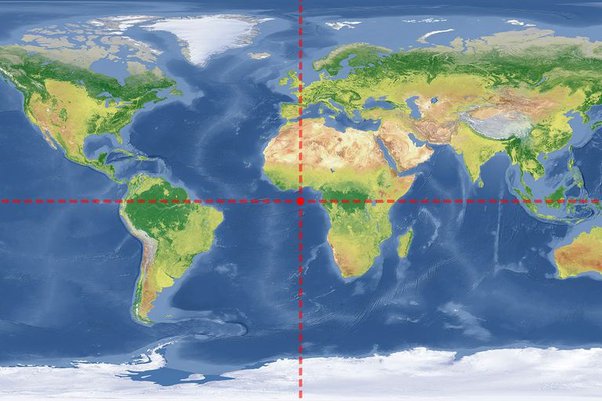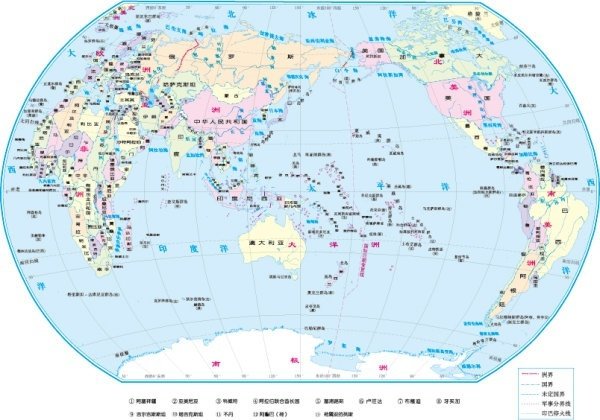No city is the “center of the world” in an objective sense. This concept is subjective and can vary based on culture, history, and personal views.
Different cultures and societies may have their own beliefs or ideas about what constitutes the center of the world. For example, Istanbul is situated at the center of the world according to some geographical location.
But, the early map of the world claims that the Jerosalem is situated at the center of the world. So, Ultimately, there is no universally accepted answer to this question.
Historical Perspectives
Ancient mythology and Delphi as the “navel of the world”:
In ancient Greek mythology, Delphi was considered the “navel of the world” (omphalos), a sacred site where the god Apollo was believed to communicate with mortals through an oracle.
The concept of Delphi as the center of the world was symbolic and had religious significance in ancient Greek culture.
Historical cities that claimed centrality for religious reasons (e.g., Jerusalem):

Jerusalem holds immense religious significance in several major world religions, including Judaism, Christianity, and Islam.
For these religions, Jerusalem has been regarded as a holy city and is often considered the center of the world in a spiritual sense due to its association with key religious events and figures.
The role of the Prime Meridian and Greenwich Observatory:
The Prime Meridian, which passes through the Greenwich Observatory in London, has played a significant role in defining the world’s reference point for time and geography.
In the late 19th century, the International Meridian Conference established the Prime Meridian as the starting point for measuring time zones and longitudes worldwide.
While this concept relates to navigation and standard timekeeping, it does not represent a cultural or religious center of the world.
These perspectives highlight how different cultures and historical periods have assigned symbolic or religious significance to various locations, but there is no universally agreed-upon “center of the world” in a geographical or objective sense.
Cultural Significance
Cities claiming centrality for cultural and historical importance (Istanbul):
Istanbul, formerly known as Byzantium and Constantinople, has a rich history spanning Europe and Asia. It has served as the capital of three great empires: the Roman, Byzantine, and Ottoman.
Due to its unique geographical location straddling the Bosphorus Strait, Istanbul has often been referred to as the “crossroads of the world” and has claimed centrality in terms of its cultural and historical importance.
The impact of cities like Quito using the title for tourism promotion:
Some cities, such as Quito in Ecuador, have used the idea of being the “center of the world” as a marketing strategy to attract tourists. Quito’s Mitad del Mundo monument, which marks the equator, has become a popular tourist attraction.
While this designation is not geographically accurate (the equator is actually slightly north of Quito), it has been used to promote tourism and celebrate Ecuador’s unique location.
New York City as the “center of the world” in economic and cultural terms:
New York City is often regarded as a global finance, culture, and media hub. It is a major center of commerce, home to the United Nations headquarters, and a melting pot of diverse cultures.
While not a claim of geographical centrality, the phrase “center of the world” has been used metaphorically to describe New York City’s significance on the global stage, especially in economic and cultural terms.
These cultural perspectives demonstrate how cities can embrace the notion of being a “center of the world” for various reasons, including historical importance, tourism promotion, and economic and cultural influence.
However, these claims are typically symbolic and do not imply a geographical or objective centrality.
Scientific and Technological Centers
Geneva, Switzerland, as a scientific hub:
Geneva is known for its significance in the field of science and international cooperation. It is home to numerous international organizations, including the European Organization for Nuclear Research (CERN).
CERN’s research and discoveries in particle physics have led some to view Geneva as a scientific center of the world.
Modern cities with claims to centrality due to technological advancements:
In the modern era, cities like Silicon Valley in California, USA, and Shenzhen in China have gained recognition as centers of technological innovation.
Silicon Valley is known for its concentration of tech companies and startups, while Shenzhen has become a major hub for electronics manufacturing and innovation.
These cities have claimed centrality in the global tech industry due to their contributions to innovation and economic impact.
How globalization has influenced the concept of the center of the world:
Globalization, the increasing interconnectedness of economies, cultures, and societies, has shifted the concept of the “center of the world” in some ways.
Traditional notions of centrality based on geography have given way to a more fluid understanding where multiple cities and regions can serve as important centers simultaneously.
Globalization has enabled cities worldwide to participate in global trade, finance, and culture, blurring the lines of what it means to be a center of influence.
These perspectives highlight how scientific and technological advancements and globalization have influenced the perception of certain cities as centers of excellence in their respective fields.
While these cities may claim centrality in their domains, it’s important to note that the “center of the world” concept remains subjective and multifaceted.
Changing Perspectives

The fluid nature of the concept over time:
The “center of the world” concept has evolved over time, reflecting changing cultural, economic, and geopolitical dynamics. What was considered central in one era may not hold the same significance in another.
As societies and technologies advance, so do the criteria for what makes a city central or influential.
How geopolitical shifts can alter which cities claim this title:
Geopolitical shifts, such as the rise and fall of empires, the emergence of new economic powers, and changes in international relations, can significantly impact which cities claim centrality.
For example, during the height of the British Empire, London was a center of global influence, but after decolonization, the focus shifted to other cities and regions.
Contemporary cities that could potentially claim centrality:
Several contemporary towns have the potential to claim centrality in various aspects of global affairs:
- Beijing, as the capital of China and a significant player in geopolitics, has asserted its influence on the global stage.
- Dubai, in the United Arab Emirates, has rapidly developed into a hub for trade, finance, and tourism in the Middle East.
- Singapore, known for its strategic location and economic prowess, is a key player in global trade and finance.
- Shanghai, China’s largest city, is often seen as a financial and economic center, especially in Asia.
- São Paulo, Brazil, is the economic heart of South America and plays a significant role in regional and global trade.
These cities, among others, have the potential to assert centrality in their respective regions or fields, but the concept remains dynamic and subject to change.
FAQs
Is there an official geographical center of the world?
No, there is no universally recognized geographical center of the world. The concept of a center of the world is largely symbolic.
Are there cities claiming to be the center of the world?
Yes, several cities worldwide claim to be the center of the world for cultural, historical, or geographic reasons.
Which city is often referred to as the “center of the world” for religious reasons?
Jerusalem is often considered the center of the world in religious contexts due to its significance in Judaism, Christianity, and Islam.
Is there a mathematical or geographic calculation for the center of the world?
No, there is no definitive mathematical or geographic calculation for the center of the world since it depends on how you define the world’s boundaries.
What is the significance of the Prime Meridian and the Greenwich Observatory?
The Prime Meridian, located in Greenwich, England, is often considered the starting point for measuring longitude and is symbolic as the center of time zones. Still, it’s not considered the center of the world.
In ancient mythology, which city is known as the “navel of the world”?
Delphi in ancient Greece was often referred to as the “navel of the world” in Greek mythology, as it was believed to be the center of the earth.
Is there a city that claims to be the center of the world for tourism purposes?
Quito, the capital of Ecuador, promotes itself as the “Middle of the World City” and has a monument marking the equator.
Are there any cities claiming to be the world’s center for cultural reasons?
Some cities, like Istanbul (formerly Constantinople), have claimed to be the center of the world due to their historical and cultural significance as crossroads between Europe and Asia.
Is there a city that claims to be the center of the world due to its economic importance?
New York City, often referred to as the “center of the world” in economic terms, is a major global financial and cultural hub.
Are there any cities claiming to be the world’s center for scientific reasons?
Geneva, Switzerland, is sometimes called the “scientific center of the world” because it houses important international scientific organizations like CERN.
Can the concept of the center of the world change over time?
Yes, the concept of the center of the world can change over time based on shifting cultural, historical, and geopolitical factors. Different cities can hold this symbolic title at different points in history.
Conclusion
In conclusion, the concept of the “center of the world” is multifaceted and can be claimed by cities for a variety of reasons:
Cities claim centrality for diverse reasons, including historical and cultural importance, religious significance, scientific and technological advancements, and economic influence. These claims often reflect the unique attributes and contributions of each city.
It’s essential to emphasize the symbolic and subjective nature of the title “center of the world.” While cities may make these claims, they are often symbolic or metaphorical in nature and should not be taken as objective geographical realities.
Ultimately, the concept of the “center of the world” is a testament to the diversity and richness of human civilization, and it invites us to explore and appreciate the various ways in which cities contribute to our global tapestry.

